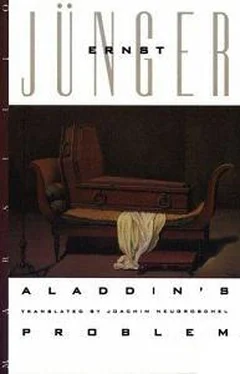That was what happened to me. Now, when I went to the homes of the deceased, I had no stage fright; this development was harmful to my character.
46
It was Bertha rather than I who noticed the change. She said, when I came home exhausted: "You can stop looking as if you've been to your own funeral!" And she was no longer trying to be funny.
When I started neglecting her, my work was only partly to blame. At breakfast, I was already leafing through the newspaper and skimming the obituaries. If was possible that an important death had eluded us. Next I drove to Potsdamer Strasse (for I now owned a car), telephoned, made house calls, and came back in the evening, often tardily. Usually, I read until late at night, since, for me, a day without books is a lost day.
Bertha had to understand that I could not devote as much time to her as back then, in the tiny room where we had huddled together, comforting one another. Poverty unites, prosperity divides. Mercury is detrimental to love.
Once I got the hang of my work, I developed a gambling addiction. Anyone who has been accompanied by success even once in a lifetime is familiar with that addiction. You now enter your office in a good mood instead of with a heavy heart as in the past. Things go smoothly. The way an expert card player shuffles and fans the cards — the sheer act of watching is a delight.
47
The atmosphere in our refined apartment grew cooler; we treated one another gingerly. Our alienation expressed itself in trivial matters — say, a necktie that she did not like. Yet she was the one who had given it to me. But it did not go with my suit.
I never allowed an argument to develop, though I am particularly touchy at breakfast. But this was not to her liking either. She would say: "Friedrich, I think you're becoming too glib. Oh, I know: The customer is always right."
I realized it — my work was rubbing off on my character. In marriage too, an acute attack is better than a chronic disorder; a knock-down, drag-out fight clears the air, and the reconciliation restores domestic peace.
However, I have to do some more thorough soul-searching and ask myself whether my change was not in fact consistent with the core of my being rather than merely symptomatic of an occupational disease.
48
Have I already mentioned that I view myself as capable of getting along with any woman provided I do not find her inherently repulsive? Bertha had realized that too. She once said to me when we were lying side by side: "I believe you love me less because I am I, than because I'm a woman — isn't that insulting to me?"
That was the age-old question of which is preferable: the wine or the beaker? I prefer the wine. The King of Thule drank from a golden beaker, which his beloved had given him; but he tossed it into the sea, gave it back to the mother. There are also earthenware beakers, and perhaps the wine tastes better from them; knowledge and culture are more likely to do damage to love. This is a problem that even the gods argue about; I cannot solve it.
That night, I kept the answer to myself an embrace is the best argument. Now I am not saying that Bertha could not have kept up her side of the conversation and not only because the studies that she had broken off for my sake had been classical languages and therefore mythology as well. She resumed them later on.
49
To deal with Bertha's question in detail, I have to enlist the aid of mythology. Our psychologists and characterologists, often without realizing it, have their roots there too. I get less from their measuring skills than from a chapter of Plutarch or Vico.
What tied me to Bertha was not just taste but also passion. We owe this distinction to Stendhal; it was he who established it. But when passion grew weaker, good taste prevented our having a quarrel a la Strindberg. Nor did another man, another woman emerge. We drifted apart, and this caused both of us distress — certainly Bertha wondered, just as I did, to what extent it was her fault.
She did not hold back with the small overtures at which women are better than we. For example, dates, which we forget more easily than they do — why were there flowers on the table today? Right — it was the anniversary of our first night together. Then again, a favorite dish would be on the table, or else she was wearing the cheap jewelry that I had given her in our student days, and her hairdo was the same as back then. These were memories of the old times, but only memories.
50
We would have drifted apart even without my work, which occupied me more and more, ultimately affecting my health, especially when the firm rose to sudden notoriety. If anyone was at fault, it was I — because of my character, which was exposed by my profession; however, time would have done the same, even under different circumstances. As a moralist once said: Aging makes not only our profiles but also our characters more distinct.
I wonder whether, in regard to eros, I fit into one of the prevailing typologies. If I were to fill out a test questionnaire, I would be the paragon of a normal spouse. I cannot oblige with any surprise, any physical or mental deviation.
One should not be content with that; statistics are devised for parochial minds. What does, say, the question "What is your favorite color?" mean to someone who feels good in a fog or who is delighted by a palette, an opal, a rainbow, a sunset in Manila? Besides, under every normal stratum, we come upon a more deeply universal stratum, the human one. Man remains the enigma per se.
After putting aside the books, I reached a conclusion: You are an erotic nihilist. What does that mean? To put it tritely: the kind of woman I like best is the one whose presence does not disturb me, who is simply not there. This, as I have said, is a very general case, and that was what disturbed Bertha about me.
Now I could get out of the predicament by claiming that I may even be an erotic idealist. A beloved's presence would be disturbing insofar as it interfered with. Aphrodite. The final chamber remains locked, and only a ray of light flashes through. That is the secret reason for so many disappointments.
The yearning for a new life can become very strong. I am thinking of the influence that the Provencal love cult exerted on the Renaissance. La vita nuova — nine-year-old Dante is transformed by Beatrice, as P etrarch by Laura; the poem is for human beings what a flood is for the cosmos: a response to vast distances.
However, I do not wish to play the metaphysical swain. Aphrodite may be missing or veil her face: the Great Mother is always there. Love changes to the extent that materialism progresses.
My nihilism is based on concrete experiences. And, as so often, it was the first encounter that served as a model, preshaping the subsequent ones.
51
It is, above all, the gods who change. Either they assume different forms and faces, or they vanish altogether. But similarities always remain, no matter how many generations are produced. It is the same as with breeds of animals.
I regard it as a mistake to call Dionysus a god; I contest it. He has a place on Mount Olympus as a close relative, also as a guest of honor. Dionysus is more than a god and less — he is earth exposed, nature revealed. He is a demon, a polymorphic Titan. This is not contradicted by one of the myths about him which says he was torn to shreds by the Titans — that is simply the way they are. Dionysus himself is torn, he tears, he is overpowering. His place is not so much on Olympus as in Eleusis, between Persephone and Demeter.
I therefore feel that Old Gunpowder-Head was wrong to put Dionysus as a god opposite Apollo — theirs was actually an encounter between Titanic-demonic and divine power. Still, Gunpowder-Head did understand that this conflict brought forth two kinds of art, especially two kinds ofmusic. He returned to Dionysus. Rather than expatiating on this, I wish to focus on the present. The fact that we, largely in a passive manner, are participating in a fall of the gods is obvious as far away as India and New Guinea. Titanic forces in mechanical disguise are supplanting the gods. Wherever Zeus no longer rules, crown, scepter, and borders are becoming senseless; with Ares, the heroes are making their farewells; and with Great Pan, nature is dying. Wherever Aphrodite is waning, there is promiscuous interbreeding.
Читать дальше












